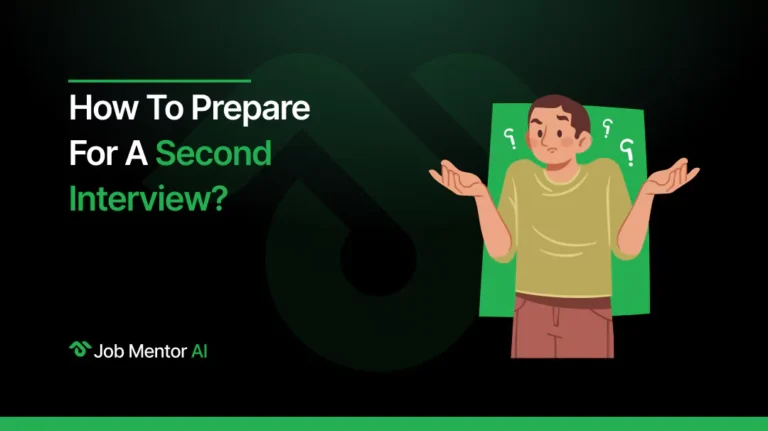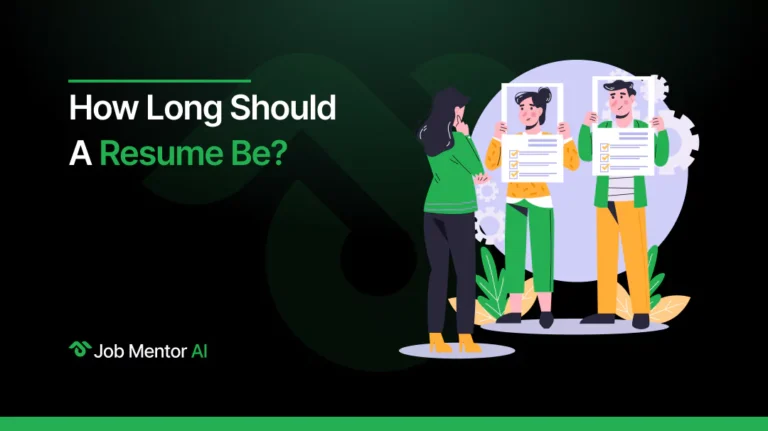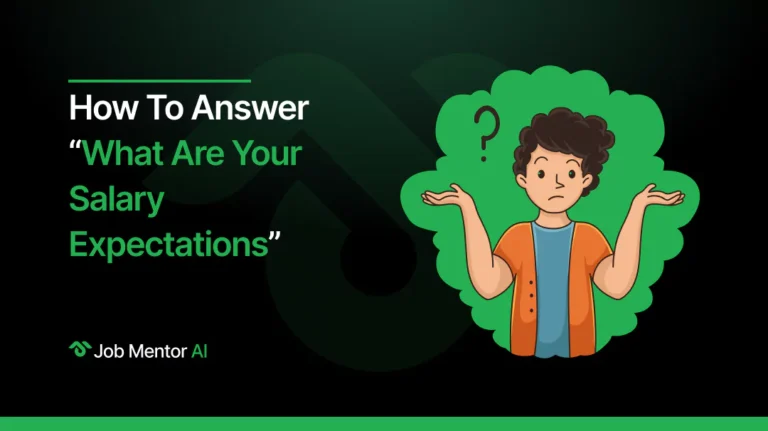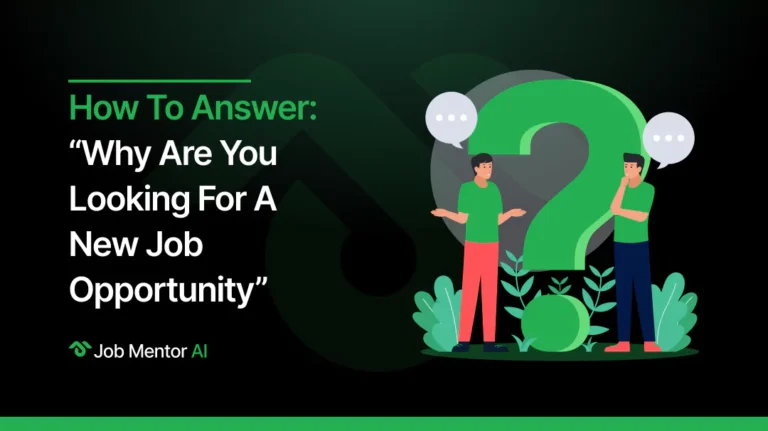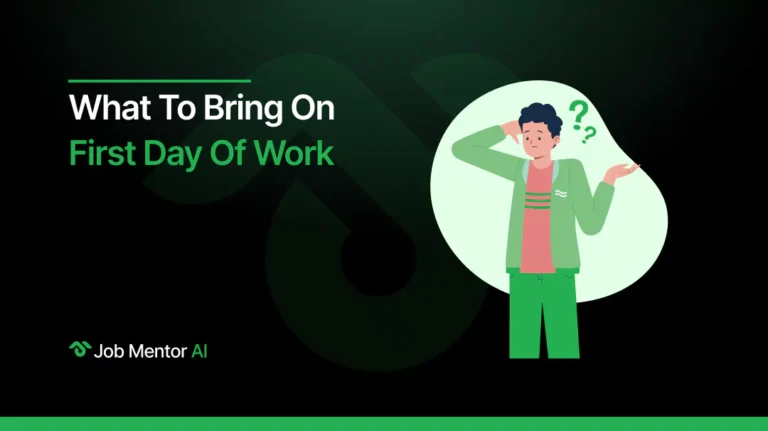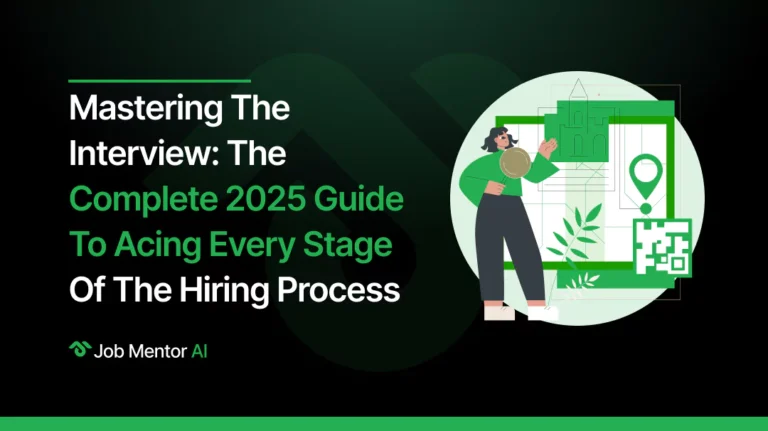When it comes to job interviews, it’s not just about your skills and experience—how you handle tough and stress-inducing questions can be just as important. Here are 25 tough interview questions that you should be prepared for, along with expert tips on how to answer them effectively.
What Are Tough Interview Questions?
Tough interview questions are designed to test how well you can handle pressure, adversity, and feedback. These questions often push you out of your comfort zone and assess your problem-solving and interpersonal skills. Interviewers use these types of questions to understand how you react in difficult situations.
Why Do Interviewers Ask Stressful and Tough Questions?
Stress and tough questions help interviewers gauge how well you can handle pressure, ambiguity, and challenging situations. These questions assess your problem-solving abilities, emotional intelligence, and resilience. These are common in different types of job interviews, especially panel and stress interviews. It’s not just about the answer but how you approach the challenge. They are commonly asked to understand how you will react in high-stakes or stressful work environments.
By preparing for stress interview questions, you’ll be ready to handle anything that comes your way. If you’re interested in a practical approach, try an AI Mock Interview Practice session, it’s a great way to simulate pressure and get real-time feedback on your performance. Whether it’s hard job interview questions or difficult interview questions, having a strategy will give you the confidence to shine. While it’s important to practice for tough interview questions, don’t forget to review common interview questions as well.
1. How do you handle criticism?
Why you might get asked this: Interviewers want to assess how well you accept feedback for growth, which is important for improving performance in any role.
How to answer:
- View criticism as a chance to improve your skills.
- Provide a real-life example where you took feedback constructively and applied it.
Example answer:
“I see criticism as an opportunity to grow professionally. In my previous role, I received feedback that my communication could be clearer.
2. How do you manage tight deadlines?
Why you might get asked this: Employers want to assess your ability to stay productive and organized under pressure, ensuring you meet deadlines efficiently.
How to answer:
- Break larger tasks into smaller steps to stay focused.
- Provide an example where you successfully met a tight deadline.
Example answer:
“When facing tight deadlines, I break tasks into manageable chunks and prioritize based on urgency. For example, when I had to submit a report under a tight deadline, I stayed organized and completed it ahead of time by focusing on the most critical sections first.”
3. What is your biggest achievement?
Why you might get asked this: This question helps interviewers understand your capability and whether you can make a positive impact on the company’s success.
How to answer:
- Share a relevant achievement that aligns with the role.
- Include the challenge, your approach, and the results.
Example answer:
“My biggest achievement was leading a team that successfully launched a new product, surpassing the sales target by 30% within three months. It was a challenging project that required excellent teamwork and leadership, and the outcome was incredibly rewarding.”
4. How do you handle working with a difficult team member?
Why you might get asked this: Employers assess your interpersonal skills and ability to manage conflict in the workplace.
How to answer:
- Show that you approach difficult situations with patience and professionalism.
- Share a specific example where you managed a challenging situation effectively.
Example answer:
“I once worked with a team member who had a very different working style. I approached the situation with open communication and listened to their perspective. By finding common ground and focusing on team goals, we worked well together and achieved the project’s success.”
5. How do you prioritize your work?
Why you might get asked this: This question helps interviewers understand your time management skills and ability to juggle multiple responsibilities effectively.
How to answer:
- Explain your approach to prioritization based on urgency and importance.
- Provide an example of when your prioritization led to a successful outcome.
Example answer:
“I prioritize tasks by assessing deadlines and importance. For instance, when I had multiple projects, I listed them according to urgency and tackled high-priority tasks first, which helped me meet all deadlines without compromising quality.”
6. What would you do if you were not given enough resources to complete a task?
Why you might get asked this: Employers want to know if you’re resourceful and can think creatively to deliver results even when resources are limited.
How to answer:
- Highlight your ability to be proactive and find solutions.
- Mention an example where you overcame resource limitations and completed a project
Example answer:
“If I’m not given enough resources, I would prioritize the most essential aspects of the task and look for alternative solutions, like leveraging existing tools or collaborating with colleagues. For example, in my previous role, I used available software to complete a task on time despite a lack of resources, ensuring the project’s success.”
7. How do you manage your time when you have multiple projects to complete?
Why you might get asked this: Interviewers want to evaluate your multitasking and time management skills to ensure you can balance competing priorities effectively.
How to answer:
- Explain how you prioritize tasks and allocate time effectively.
- Provide an example of how you managed multiple projects with tight deadlines.
Example answer:
“I break down my projects into smaller tasks, then prioritize them based on deadlines and impact. I ensure time is allocated for each task, which helps me stay on track. For example, while managing three projects at once, I used a time-blocking method to ensure I met all deadlines.”
8. Describe a situation where you had to go above and beyond your job responsibilities.
Why you might get asked this: Employers want to see if you’re willing to take initiative and contribute beyond the minimum expectations.
How to answer:
- Highlight a specific situation where you took extra steps to contribute to the team’s success.
- Emphasize how your actions benefited the company.
Example answer:
“In my previous role, I volunteered to lead a training program for new hires, even though it wasn’t part of my responsibilities. By doing so, I helped improve the team’s efficiency, and the program became a key resource for future hires.”
9. What would you do if you were asked to work overtime unexpectedly?
Why you might get asked this: Employers are testing your willingness to go the extra mile when necessary, especially during busy periods.
How to answer:
- Show that you’re flexible and committed to getting the job done.
- Mention a time when you worked overtime and why it was necessary.
Example answer:
“If asked to work overtime, I would assess the urgency of the task and make sure it aligns with the project’s overall goals. For example, during a product launch, I worked extra hours to ensure all deliverables were completed on time, which helped the team meet the deadline.”
10. What would you do if you were given negative feedback on your performance?
Why you might get asked this: Employers want to see if you can handle constructive criticism and take responsibility for your actions.
How to answer:
- Show that you can accept feedback positively and use it for growth.
- Share an example where you received feedback and improved your performance.
Example answer:
“When I received negative feedback about a presentation I gave, I reflected on it, sought advice from my manager, and worked on improving my presentation skills. The next time I presented, I was much more confident and clear, and it was well received.”
Prescreening Interview Questions with Answers
11. Can you describe a time when you faced a significant challenge at work and how you handled it?
Why you might get asked this: Employers are assessing your problem-solving skills and ability to handle difficult situations.
How to answer:
- Discuss a challenging situation, how you approached it, and the positive outcome.
- Emphasize your problem-solving approach and resilience.
Example answer:
“I once faced a significant challenge when a project’s deadline was moved up unexpectedly. I immediately reorganized my team’s tasks, delegated work efficiently, and ensured clear communication. We completed the project ahead of the new deadline, and the client was very impressed with the result.”
12. How do you deal with situations when you don’t know how to complete a task?
Why you might get asked this: Employers want to evaluate your problem-solving and resourcefulness when faced with uncertainty.
How to answer:
- Demonstrate that you’re proactive in seeking help or researching solutions.
- Share an example where you found a way to complete a task despite not knowing how at first.
Example answer:
“When I encounter a task I don’t know how to complete, I first research solutions online or consult with colleagues who have experience. For example, when I was tasked with using new software, I took an online course and asked for guidance from a team member, which helped me successfully complete the task.”
13. Tell me about a time when you had to learn a new skill quickly.
Why you might get asked this: Employers want to gauge your ability to adapt and acquire new skills, which is essential for growth and staying competitive in the workplace.
How to answer:
- Show that you are open to learning and capable of picking up new skills under pressure.
- Provide a concrete example where you learned something new within a short period.
Example answer:
“In my previous role, I had to learn a new software tool to complete a project. Despite having no prior experience with it, I dedicated extra hours to online tutorials and sought help from colleagues. Within a week, I was proficient and successfully completed the project on time.”
14. How do you stay motivated when working on repetitive tasks?
Why you might get asked this: Employers want to understand how you maintain productivity and enthusiasm during tasks that may feel monotonous or routine.
How to answer:
- Emphasize how you find value in even the most repetitive tasks and focus on the bigger picture.
- Highlight strategies you use to stay engaged and maintain a high standard of work.
Example answer:
“I stay motivated by reminding myself of how these tasks contribute to the overall success of the project or company. I also break tasks into smaller, manageable steps and celebrate completing each one. This helps me stay engaged and maintain my productivity.”
15. What would you do if you disagreed with your manager on a project?
Why you might get asked this: Employers want to assess your conflict resolution and communication skills, ensuring you can work collaboratively even when opinions differ.
How to answer:
- Show that you can respectfully express differing opinions and have constructive conversations.
- Highlight your willingness to collaborate for a solution that aligns with the project’s goals.
Example answer:
“If I disagreed with my manager, I would first ensure I fully understand their perspective, then present my viewpoint in a respectful and constructive manner. By having an open discussion, we could find a solution that works best for the project and team.”
15. What would you do if you disagreed with your manager on a project?
Why you might get asked this: Employers want to assess your conflict resolution and communication skills, ensuring you can work collaboratively even when opinions differ.
How to answer:
- Show that you can respectfully express differing opinions and have constructive conversations.
- Highlight your willingness to collaborate for a solution that aligns with the project’s goals.
Example answer:
“If I disagreed with my manager, I would first ensure I fully understand their perspective, then present my viewpoint in a respectful and constructive manner. By having an open discussion, we could find a solution that works best for the project and team.”
16. How do you stay organized and manage multiple responsibilities?
Why you might get asked this: Employers want to evaluate your organizational skills, especially when managing multiple projects and tasks.
How to answer:
- Explain your system for prioritizing and organizing tasks.
- Share an example of how you handled multiple responsibilities successfully.
Example answer:
“I use task management tools to break down larger projects into smaller tasks and set clear deadlines. By organizing my tasks this way, I stay focused and ensure nothing falls through the cracks. For example, during a busy period, I was able to manage multiple projects by prioritizing based on urgency and importance.”
17. Can you describe a time when you worked under pressure and how you managed it?
Why you might get asked this: Employers want to know how you perform under stress and whether you can meet deadlines or targets when things get hectic.
How to answer:
- Show how you stayed calm and focused in high-pressure situations.
- Provide an example of a specific situation where you successfully handled stress and still achieved the desired result.
Example answer:
“During a major product launch, the timeline was tight, and unexpected issues arose. I managed the pressure by staying organized and prioritizing tasks effectively. By maintaining open communication with my team and focusing on one task at a time, we successfully launched on schedule.”
18. How do you handle situations when you miss a deadline?
Why you might get asked this: Employers want to know how you take responsibility for mistakes and how you handle setbacks professionally.
How to answer:
- Acknowledge the importance of deadlines and your commitment to meeting them.
- Share how you address the situation and prevent it from happening in the future.
Example answer:
“If I miss a deadline, I immediately inform my manager, provide an explanation, and offer a revised timeline. I also take steps to ensure I improve my time management, like using task management software to better track progress and avoid future delays.”
19. What strategies do you use to manage stress in the workplace?
Why you might get asked this: Employers want to know how you handle stress in a healthy way and ensure it doesn’t negatively impact your performance.
How to answer:
- Share specific strategies or techniques you use to stay calm under pressure.
- Mention how these methods help you stay focused and maintain productivity.
Example answer:
“I manage stress by taking short breaks throughout the day to reset my mind. I also practice deep-breathing exercises and prioritize my tasks to stay focused. This allows me to handle challenging situations without becoming overwhelmed.”
20. How do you handle changes to project scope or last-minute requests?
Why you might get asked this: Employers want to assess how adaptable and flexible you are when changes occur in the workplace.
How to answer:
- Show your willingness to adapt and your problem-solving approach.
- Explain how you manage changes without compromising the quality of the project.
Example answer:
“When changes occur, I immediately assess the impact on the project and communicate with my team to adjust timelines or resources accordingly. I also stay flexible and make necessary adjustments while ensuring the quality and goals of the project are still met.”
21. Tell me about a time you made a mistake at work and how you addressed it.
Why you might get asked this: Employers want to see how you take responsibility for errors and how you learn from them.
How to answer:
- Acknowledge the mistake and show how you took responsibility.
- Explain the steps you took to rectify the mistake and what you learned from it.
Example answer:
“Once, I made a mistake in a report due to a misunderstanding. I took responsibility for it and immediately informed my manager. I corrected the error, learned the importance of double-checking details, and implemented a system to avoid similar issues in the future.”
22. How do you approach problem-solving when faced with an unexpected issue?
Why you might get asked this: Employers want to see how you take responsibility for errors and how you learn from them.
How to answer:
- Acknowledge the mistake and show how you took responsibility.
- Explain the steps you took to rectify the mistake and what you learned from it.
Example answer:
“Once, I made a mistake in a report due to a misunderstanding. I took responsibility for it and immediately informed my manager. I corrected the error, learned the importance of double-checking details, and implemented a system to avoid similar issues in the future.”
23. How do you balance your work and personal life?
Why you might get asked this: Employers want to understand if you can manage your time efficiently and avoid burnout.
How to answer:
- Emphasize your ability to prioritize tasks and set clear boundaries between work and personal time.
- Share any specific strategies you use to ensure a healthy work-life balance.
Example answer:
“I balance work and personal life by setting clear boundaries and making use of tools like calendars to schedule both professional and personal activities. I prioritize important work tasks and use my time outside of work to recharge and maintain my overall well-being.”
24. What kind of work environment helps you perform at your best?
Why you might get asked this: Employers want to know if your ideal work environment aligns with their company culture.
How to answer:
- Be honest about the work environment where you thrive, but make sure it aligns with the company’s culture.
- Mention specific factors that help you perform well, such as a collaborative atmosphere or a structured setting.
Example answer:
“I perform best in a collaborative work environment where open communication and teamwork are encouraged. I also value clear goals and regular feedback, as they help me stay focused and improve my performance.”
25. Can you give an example of a time when you had to work with someone with a different working style?
Why you might get asked this: Employers want to see if you can collaborate effectively with people who have diverse work habits.
How to answer:
- Explain how you adapted to different working styles to achieve a common goal.
- Provide a specific example of a situation where you successfully collaborated despite differences in working styles.
Example answer:
“Once, I worked with a colleague who preferred to handle tasks independently, while I prefer teamwork. To ensure we met our objectives, I adjusted by respecting their need for autonomy and offering support when needed. This approach led to successful project completion and improved our working relationship.”
Tips to Prepare for Tough Interview Questions
1. Understand the Common Types
Know the categories—behavioural, situational, and problem-solving. Review common questions like:
“Tell me about a time you failed.”
“How do you handle pressure?”
2. Use the STAR Method
Structure your answers using:
Situation, Task, Action, and Result. This keeps your response clear and focused.
3. Stay Calm and Take a Breath
It’s okay to pause before answering. Collect your thoughts to avoid rushing.
4. Practice Your Answers
Rehearse out loud or with a friend. Mock interviews help reduce anxiety.
5. Be Honest but Positive
Even if you’re sharing a challenge, focus on what you learned or how you grew.
6. Know the Job Role
Match your answers with the job’s requirements to show you’re a good fit.
7. Show Soft Skills
Highlight traits like adaptability, teamwork, time management, or communication.
How to Deal with Tough Questions in the Moment
Here are some ways to deal with tough questions:
- Ask for clarification if the question is unclear.
- Stay calm, positive, and confident in your tone and body language.
- Don’t be afraid to say “I don’t know,” but explain how you’d find the answer.
- Take a moment to gather your thoughts before answering.
- Use the STAR method (Situation, Task, Action, Result) for structured answers.
- Be honest but focus on what you learned or how you improved.
- Relate your answer to the job role or key skills when possible.
Conclusion
As you prepare for those tough interview questions, it’s important to be ready for anything that might come your way. Additionally, with AI Interview Answer Generator, you can receive tailored questions based on your specific job role, helping you focus on what matters most for your career. With the right preparation and practice, you’ll be ready to approach any interview with confidence.
Table of Contents
Frequently Asked Questions
What are tough interview questions?
Tough questions test your behaviour, thinking, and problem-solving skills.
Examples include:
- How do you handle criticism?
- How do you manage tight deadlines?
- What is your biggest achievement?
- How do you handle working with a difficult team member?
- How do you prioritize your work?
- What would you do if you were not given enough resources to complete a task?
- How do you manage your time when you have multiple projects to complete?
- Describe a situation where you had to go above and beyond your job responsibilities.
- What would you do if you were asked to work overtime unexpectedly?
- What would you do if you were given negative feedback on your performance?
- Can you describe a time when you faced a significant challenge at work and how you handled it?
- How do you deal with situations when you don’t know how to complete a task?
- Tell me about a time when you had to learn a new skill quickly.
- How do you stay motivated when working on repetitive tasks?
- What would you do if you disagreed with your manager on a project?
- How do you stay organized and manage multiple responsibilities?
- Can you describe a time when you worked under pressure and how you managed it?
- How do you handle situations when you miss a deadline?
- What strategies do you use to manage stress in the workplace?
- How do you handle changes to project scope or last-minute requests?
- Tell me about a time you made a mistake at work and how you addressed it.
- How do you approach problem-solving when faced with an unexpected issue?
- How do you balance your work and personal life?
- What kind of work environment helps you perform at your best?
- Can you give an example of a time when you had to work with someone with a different working style?
What to ask in a job interview?
Asking the right questions shows you’re genuinely interested in the role and the company. It’s also a great chance to find out if the job is the right fit for you. If you’re wondering about the best questions to ask a hiring manager, here are some thoughtful options:
- “What does a typical day look like in this role?”
- “What qualities make someone successful in this team?”
- “What’s the next step in the hiring process?”
Tip: Avoid asking about salary, leave policies, or benefits in the first round unless the interviewer brings it up.
What is the hardest interview question?
The hardest interview question is often “What is your biggest weakness?” or “Tell me about yourself.” These questions seem simple but require self-awareness and a strategic answer that aligns with the job.
How stressful is an interview?
Interviews can be stressful, especially if you’re unprepared or it’s your dream job. But with the right mindset and preparation—like mock interviews and researching common questions—you can stay calm and confident.
What are the tricky HR questions?
Some of the tricky HR questions are:
- “Where do you see yourself in 5 years?”
- “Why did you leave your last job?”
- “Describe a workplace challenge you’ve faced.
These HR questions are tricky because they assess not just your skills, but your values, growth mindset, and cultural fit.
How long does an interview take?
Most interviews take between 30 to 60 minutes, depending on the role and the round. A technical or final interview may take longer, especially if it includes tests or panel discussions.


